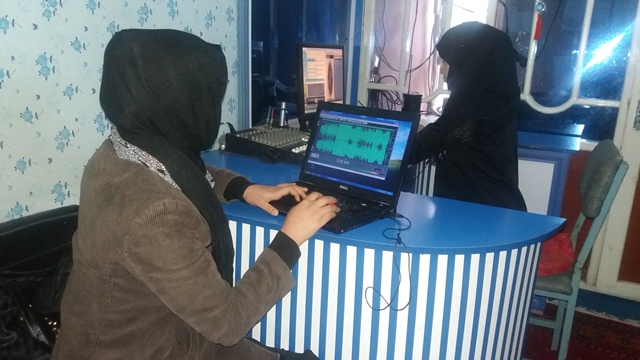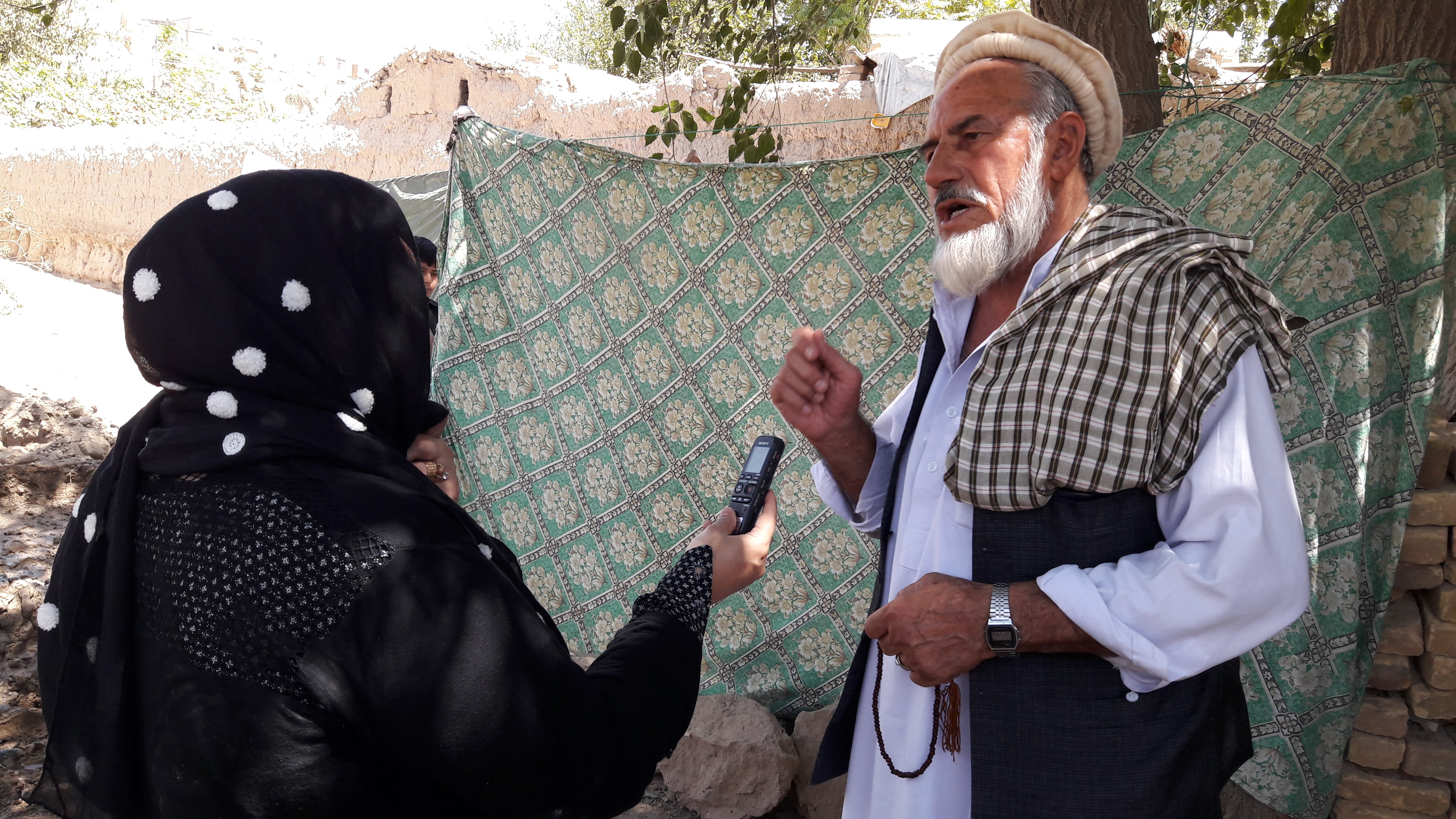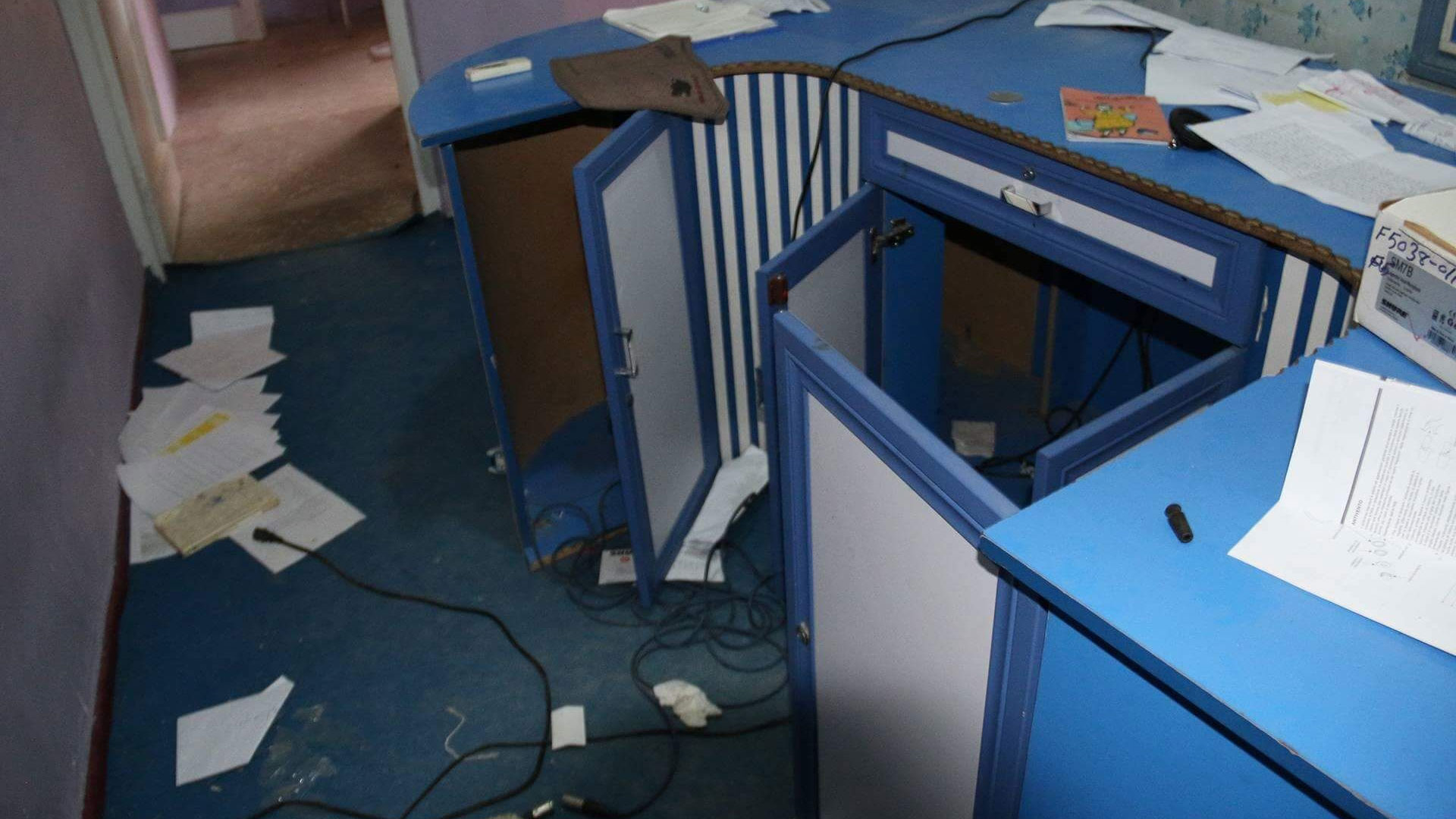Kunduz once bustled as the cotton-mill capital of northeast Afghanistan. Amid Afghanistan’s 39-year-old war, it is now half-empty, fearful and bullet-pocked—a target in the Taliban’s fight to capture a major city. Remarkably, Kunduz also is a stronghold of Afghanistan’s women’s movement, including a handful of women-run radio stations. So when Taliban fighters briefly seized Kunduz in 2015 and attacked it again last year, they tried each time to kill Sediqa Sherzai, a journalist and mother who runs Radio Roshani.

The Story in Photos: Afghan Women Confront the Taliban in Kunduz
Patriarchy
A market in the provincial capital is filled mainly with men. Tradition keeps most women at home. When in public, they wear the all-covering burka.
A Women's Radio Station
Women journalists work at Radio Roshani, one of several women’s stations founded by a community of educated, activist women in Kunduz.
A Small Revolution
Radio Roshani’s founder, Sediqa Sherzai, interviews a resident in a village near Kunduz. The station broadcasts discussion of women’s rights to rural areas held by Taliban fighters.
Taliban Threat Looms
An Afghan army armored vehicle crosses a main square in central Kunduz. The army reinforced its presence after Taliban fighters seized the city in 2015.
Taliban Target
Radio Roshani’s office, looted by Taliban in 2015. When the insurgents seized Kunduz, they quickly looted the station and offices of other women’s rights groups in the city. Radio Roshani needed months to get back on the air.
Each day Sherzai, her husband and a small staff power up Radio Roshani’s FM transmitter to beam their message across northeastern Afghan provinces. With support from the U.S. Institute of Peace, Sherzai and her team air discussion programs, interviews of women, readings from the Quran and call-in shows to contest the Taliban’s violent interpretation of Islam. They urge women to assert their rights to education and a voice in their communities.
“USIP is funding weekly shows in which Sediqa engages citizen voices who oppose the Taliban and who oppose weak and corrupt government,” said Scott Worden, USIP’s director for Afghanistan. “This is an effective, low-cost way to break down the extremist narratives of the Taliban and ISIS. It’s important not only for Afghans but for American interests.”
Women’s radio stations are the most public voice of the Afghan women’s movement, and one of its most potent tools. That’s because they span Afghanistan’s old and deep urban-rural divide, broadcasting directly to women and girls in isolated, patriarchal villages. Of a dozen or so women-run stations across Afghanistan, five are in Kunduz—the product of an energetic, local group of educated women like Sherzai.
Sediqa is taking a big personal risk to air the voices of local citizens so that officials can hear them and respond to the public’s concerns.
When the Taliban seized Kunduz in October 2015, truckloads of fighters methodically hunted women activists, driving quickly to the offices of the radio stations, a women’s training center and a women’s shelter to destroy them. Since that Taliban takeover, which lasted 14 days, Sherzai is one of a relative few women leaders who have returned.
Kunduz: A Critical Test
The Taliban’s brief fall of Kunduz to the Taliban was an urgent wakeup call, analysts have said.
“That battle showed that the Taliban has strength far beyond the border regions with Pakistan, and that the Afghan National Security Forces remain vulnerable without continued international advice and support,” Worden said in an interview. “Also, the Afghan government needs to overcome its own political divisions to establish more effective security and build public credibility.”
Sixteen months later, Kunduz feels no more secure, say Sherzai and other residents. Government troops hold off the main Taliban forces just outside the city, but the insurgents still can attack. Last August, she says, the Taliban came the closest in what she counts as four attempts to kill her.
“I was riding in the car with my daughter, who is three, and our driver,” she said. “The Taliban had planted a bomb in the road and as we passed, it exploded. It blasted the car up into the air, but somehow we all survived. But I remained deaf from the explosion. For two months, I could not hear properly.”
Sherzai “is a leading example of the daily courage Afghan civil society activists, especially women, display to push for a stronger, more responsive government and to insist that the country will not return to Taliban-style rule,” said Worden. Only half of men and a quarter of women are literate in Afghanistan, so radio stations are vital public tribunes, he noted.
“Sediqa is taking a big personal risk to air the voices of local citizens so that officials can hear them and respond to the public’s concerns,” Worden said.
Since the Taliban regime’s overthrow in 2001, the U.S.-backed central government has controlled Kunduz, like most provinces, through local strongmen who often are corrupt. In Kunduz province, those have been ethnic Tajiks or Uzbeks who took jobs and land for their supporters and alienated ethnic Pashtuns, say political analysts such as Helena Malikyar, a Kabul-based researcher. The government lost further support in Kunduz by arming local ethnic militias as “Afghan Local Police” units that proved brutal and ineffective, according to Ali Jalali, who has been an Afghan interior minister and a USIP analyst.
Home-Grown Women’s Movement
Still, in recent years, Kunduz bred a local women’s movement. The city’s previous prosperity—a local cotton milling company was called Spinzar (“White Gold”)—helped build an elite that educated its daughters. In the 1980s, “my critical source of support” was “an enlightened family that let me complete my education” in a Kunduz high school, Sherzai said in an interview in Kabul. When the Taliban regime of 1996 to 2001 confined women nearly to a state of house arrest, she ran a covert school for girls.
After the Taliban’s overthrow, Kunduz city’s university reopened and Sherzai completed a degree. As an educated woman, “I saw a huge difference between my own situation and that of most Afghan women,” she said.
Tribal codes treat women as effectively the property of their male relatives. Family patriarchs may offer their daughters, sisters or nieces in marriage to cement political or business alliances, pay debts, buy property or settle feuds. The codes stress women’s role as symbols of families’ honor and thus the need to keep them isolated and pure of contact with men outside their families. The Taliban, like many pro-government politicians and warlords, draw their policies toward women largely from those tribal codes, but describe them as unalterable mandates of Islam.
“I decided to open a radio station, because I saw the needs of women who don’t have any idea that Islam guarantees them rights,” said Sherzai. “This way they can be educated, they can learn ways to improve their families’ lives, take care of their children and improve the society around them.”
Sherzai founded Radio Roshani (“Enlightened Radio”) eight years ago. To become a journalist, “I had to develop on my own, learning on the job,” she said. The women’s stations lean heavily to discussion and educational programs.
For years, a young cleric, Noor ul-Huda, hosted religious shows on Roshani explaining that Taliban strictures against women were un-Islamic. In April 2015, callers made threatening phone calls to Noor ul-Huda and to Sherzai, she recalled. Several days later, a bomb planted in the cleric’s car exploded and killed him.
Urban-Rural Divide
Afghanistan’s women’s rights movement is a century old, and its current generation is stronger than in the past, partly because it is reaching further into the countryside. Social change in modern Afghanistan has succeeded or failed over its acceptance in rural society. Rights for Afghan women were first championed in the 1920s by a modernizing king, Amanullah, and by his wife, Soraya, who had been educated in exile. But rural tribal and religious leaders supported a rebellion that overthrew the couple. A rural backlash against women’s rights also was part of the uprisings against leftist rule and the Soviet occupation in the 1980s.
I decided to open a radio station, because I saw the needs of women who don’t have any idea that Islam guarantees them rights.
Since the Taliban overthrow in 2001, the Afghan women’s movement has bridged the urban-rural divide more successfully because city and village women shared years of suffering from Afghanistan’s wars, including as refugees in exile, according to Belquis Ahmadi, an expert on Afghan human rights and law at USIP. “This has created a solidarity, a sisterhood, among urban and rural women that did not exist in the past,” she said.
“More rural women, who themselves are little educated, are willing to send their daughters to school than ever in Afghan history,” Ahmadi said. And Afghan women’s groups, now stronger than in previous years, have workers “putting their lives at risk to help women in rural areas, including the most remote parts of the country.” Still, radio broadcasts might be almost the only medium that many rural women hear, other than sermons of local mullahs broadcast on mosque loudspeakers.
Opposition to women’s rights comes not only from the Taliban but from urban men who denounce the concept as an anti-Islamic effort to promote licentiousness in Afghan society. A 2009 decree by President Hamid Karzai that outlawed child marriage and other abuses against girls and women triggered protests in Kabul streets and in parliament, and has gone essentially unenforced.
Journalism, including by women, has mushroomed since the Taliban’s overthrow. Afghanistan had no acknowledged women journalists or media workers in 2001, but employed 2,300 by 2013, said Shaffiqa Habibi of the Afghan Women Journalists’ Union. Still, by then, as many as 300 women had quit journalism because of pressure from family members or threats by men who see their public role as a violation of the tribal codes, she said. Eight women are among 40 Afghan journalists who have been killed since 2001, according to Nai, an Afghan media advocacy group.
Hunted by the Taliban
For years, Sherzai has received letters and phone calls threatening to kill her for urging women to assert their rights, she said. In 2014, a caller warned the station to silence broadcasts encouraging people to vote in that year’s presidential election. Soon after, militants “fired a rocket that exploded 20 meters from our station,” she said.
For Sherzai, Kunduz and Afghanistan’s government, the threat sharpened on the morning of September 28, 2015. Taliban fighters overwhelmed government soldiers and streamed into the city. Sherzai and her staff fled the station before the Taliban reached it.
“I went into hiding for three days, in a single room,” she said. “I wanted no one even to hear my voice,” which the insurgents might recognize from the radio. “The Taliban have beheaded women who work for women’s rights.”
She escaped with her husband to Kabul and returned only after extra government troops and U.S. reinforcements forced the Taliban out of Kunduz. The 14-day battle included the erroneous U.S. airstrike that shattered a hospital of the aid group Doctors Without Borders, killing more than 40 people.
When Sherzai and her husband re-entered their city, “bodies were lying in the streets,” she said. “We had to organize people just to wash the blood from the roads.” Sherzai found the offices of Radio Roshani ruined—equipment and windows smashed, and files burned.
Sherzai and her husband worked for months, and received donations of replacement equipment, to struggle back onto the air. Seven of her 10 women staffers fled Kunduz and did not return, so she has hired and trained new reporters. At least three of the city’s women’s stations now are run largely by men, their women owners or managers working from Kabul or abroad.
Now, “sometimes we have to vary the times and routes of our travel,” she said. “We can’t move freely around the city to attend meetings or interview women. In fact, many women now are afraid to be interviewed,” and the station struggles financially, she said.
Sherzai persists, she said, because “there are huge differences between a woman who is educated and understands what rights she has in the society” and a woman who does not.
“We will keep working as long as Kunduz does not fall again to Taliban control,” she said. “We have been doing so despite all the threats, which have become routine for us.”
USIP’s senior media officer in Kabul, Rahimullah Basharat, contributed to this article.






